PLACE DRAFT Response to Short Term Lets Licensing Consultation 2022
https://consultationhub.edinburgh.gov.uk/sfc/short-term-lets-2022/consultation/intro/
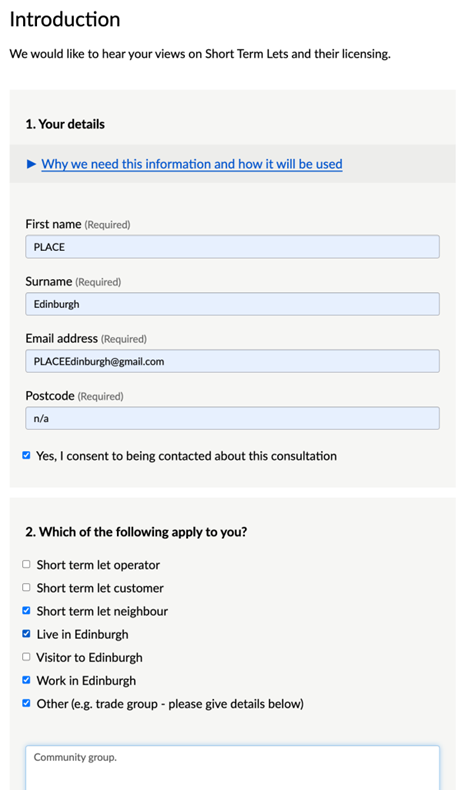
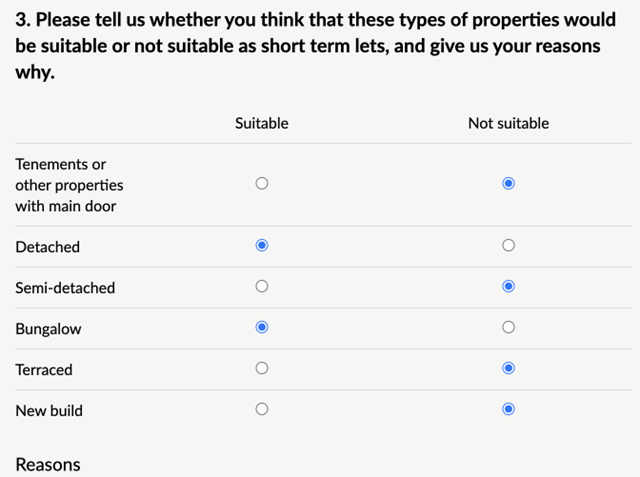
The demand for housing in Edinburgh is so great that housing should always be prioritized as a home. We understand this will be reflected in the new Edinburgh City Plan.
In exceptional circumstances where the property would not be suitable as a home, commercial short-term lets should only be allowed in detached properties that do not have close neighbors due to the impact on neighbouring homes in terms of security, disturbance and community cohesion.
Accessible homes including main door, ground floor and other accessible types of homes need special protection so they are not inadvertently incentivised for short-term lets. There is a very short supply of accessible properties in Edinburgh.
If new builds are built to increase the supply of housing in the area it is logical that they should remain as housing.
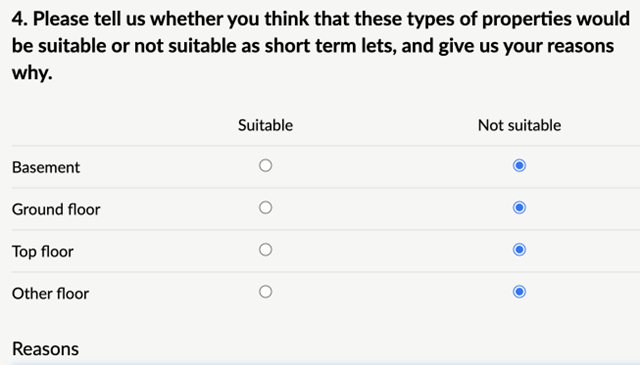
Tenement type properties on all floors are unsuitable for commercial short-term letting due to the high level of disturbance brought and the impact on the safety and security of neighbouring families. This is supported by scores of planning DPEA decisions and the testimony of neighbours.
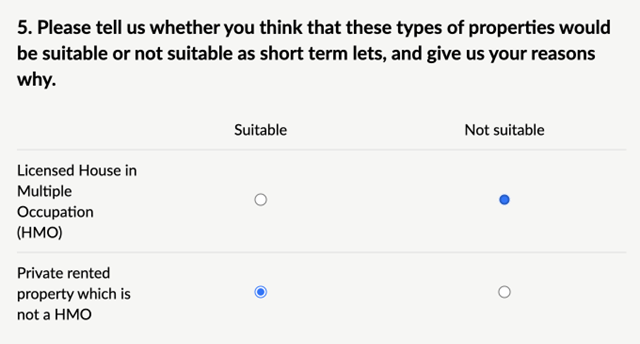
Those who live in HMO properties where rooms are also rented on a short-term basis have found this particularly detrimental to their peace, security and sense of home.
There is a trend for landlords to use high rents to encourage tenants to vacate the property over July and August so that the property can be rented short term for high profit over the Festival period.
Tenants should however retain the ability to home share using home sharing licenses, with the permission of the property owner.

Accessible and affordable housing must be specifically protected.
The unsuitability of flats for short-term letting incentivises main door properties for this use. This will have an impact on the availability of accessible homes if they are not protected.
Edinburgh is recognised as a city of high housing costs, so affordable homes need extra protection to support our businesses and services by ensuring that lower paid workers can afford to live in the city.
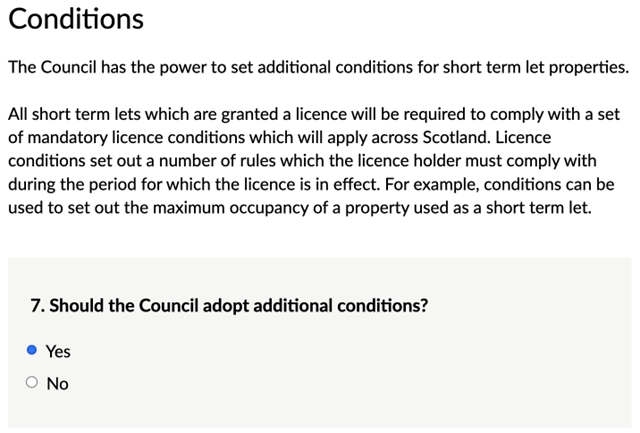
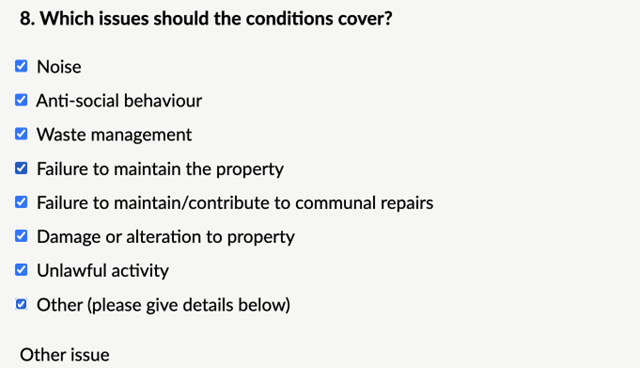
All of the above.
However, if compliance with a specific condition is necessary to make a property suitable for short-term letting the authority must consider the realistic likelihood of these condition being met, the burden to neighbours in policing this, and the fairness to the customers using the let to limit their enjoyment in what is meant to be a holiday let e.g. Is it likely that stag and hen parties will not use outdoor areas after 9pm?
Hot tubs may also need special conditions as the PLACE network receives a high level of complaints from neighbours of even fully detached homes where hot tubs have a tendency to encourage regular late night noise, antisocial and unsafe behaviour.
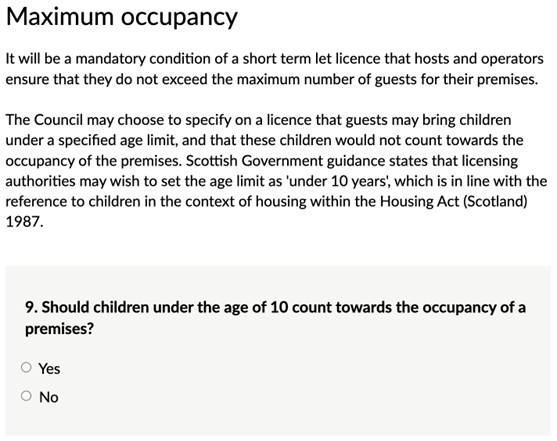
Yes.
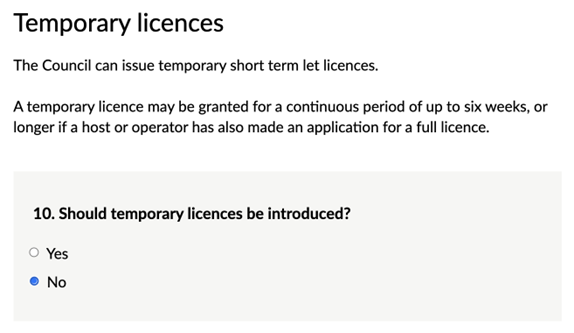
Temporary licenses should only be introduced for home sharing, not commercial licenses.
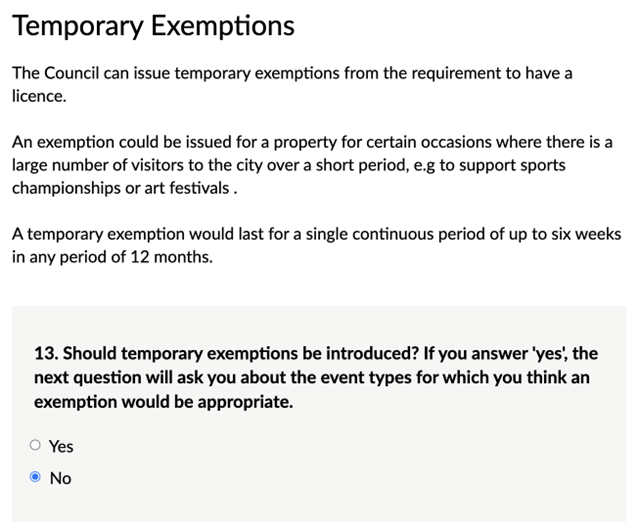
Absolutely not.
License exemptions will undermine the whole purpose of the legislation. It will –
- Undermine the whole purpose of the legislation which is to improve the safety and reputation of Edinburgh short-term let properties.
- Incentivise the retention of properties for investment rather than homes by providing a loophole for a period of highly profitable, high turnover short-term letting.
- Motivate evictions by unscrupulous landlords for the exception period.
- Enable unsafe properties to be rented to our visitors.
- Permit unlawful levels of disruption to neighbours. This will happen at a time when they most want to enjoy the peace and security of their homes. The case at Ratcliffe Terrace is evidence that annual letting of just 30 days (over 14 lets) an unlawful change of use with detrimental impacts on the living conditions of neighbours.
- Only benefit those who own multiple empty properties, as commercial letting and home sharing is already enabled by core legislation.
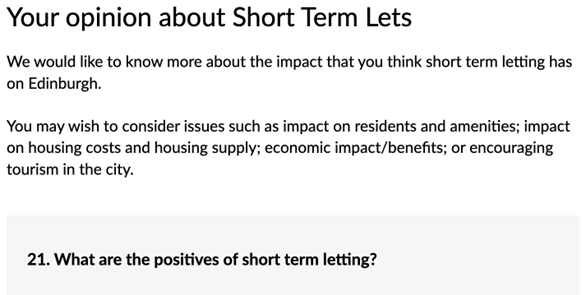
Positive impacts
Inexpensive holidays for consumers – short-term holiday lets are generally quite inexpensive compared to many other types of accommodation.
The provision of catering facilities means the consumer does not need to spend money in local restaurants and cafes thus saving them more money.
Genuine home sharing and letting – It can allow a household to let their own home when they are away e.g. on holiday.

Negative impacts
Economic costs – The Economic Policy Institute finds that the economic costs imposed by short-term letting likely outweigh the benefits. Property owners may benefit but the beneficiaries are disproportionately high-wealth individuals who can own more than one property.
Claimed increases in economic activity are often vastly overstated because the spending would have occurred anyway by travellers staying in other accommodations. The Economic Policy Institute finds that there is little evidence that cities with an increasing supply of short-term Airbnb rental accommodations are seeing a large increase in travellers.
Instead, accommodations supplied via Airbnb seem to be a nearly pure substitution for other forms of accommodation. Furthermore, the shift from traditional hotels to Airbnb lodging leads to less-reliable tax payments to cities[1].
Scottish Government figures report that there has been no significant increase in income from tourism since 2011. In fact, 2018 had the second lowest total tourist spend since 2011.[2]
Privacy – Residents of flats or properties with shared gardens are forced to share communal but still private areas of their homes with fee-paying strangers who they have never met before and are unlikely to meet again. This had been found unacceptable in planning and civil law.
Security – The security of communal spaces is completely lost. Neighbours cannot tell who is supposed to be in the property and who is not, or who has keys to shared areas. The insecurity of a shared building is advertised by key safes which are installed without permission from neighbours or listed building consent. Properties where mail comes through a single letterbox for all the residents are particularly vulnerable. Anecdotally there is evidence that short-term let customers are more likely to leave shared entrance doors open, which has resulted in residents coming home to unknown people using drugs, and engaging in other antisocial or threatening activities in their mutual shared areas.
Anti-social behaviour – Neighbours of short-term lets are almost guaranteed to experience anti-social behaviour from customers. Alcohol is a regular contributing factor which makes these situations particularly unpredictable and intimidating to deal with. Members of the PLACE network regularly describe issues relating to waste disposal, parking issues, noise, people returning late at night or arriving early in the morning, customers ringing the wrong doorbells or trying to enter the wrong doors, banging on doors, setting off fire alarms, barking dogs when animals are not allowed, friends of “guests” attending the property, parties, over-occupation, verbal abuse, damage to property, intoxication, intrusion into private space, drinking and smoking in communal spaces, and tampering with residents’ property.
Disturbance and noise – It is well established through planning and civil law that short-term lets bring an increased level of noise and disturbance. The groups occupying the property on a short-term basis are almost always on holiday with the associated holiday mindset seven days a week. Due to there being no personal belongings in short-term let businesses there is nothing to soak up sound resulting in an echo chamber being created where previously there would have been no noise pollution to neighbours, every scrape of a chair and conversation can be heard. Likewise, most properties in Scotland do not have carpeted entrances and hallways as hotels do, so the banging of suitcases at all hours and the excited chatter of customers echoes at entrances and in hallways. There is additional noise and disturbance as groups bring their belongings in and out of properties, including dragging suitcases and banging them off walls and doors, damaging the paintwork. Cleaners and greeters attend to turn over each property between every short-term let, which can mean banging and vacuuming past midnight. Cleaners and laundry companies may leave trip hazards in shared areas such as large laundry bags. Some letting agencies offer “luggage drop off” services where suitcases are then left in common stairs to be retrieved by customers later.
Mental health impacts – Residents draw huge comfort from a home which has a basic level of familiarity, stability and security. The regular intrusion of transient pleasure-seeking strangers is deeply unsettling. Neighbours of short-term lets regularly describe feeling stress, anxiety and other mental health impacts. This disproportionately impacts on disabled people, people with long term health conditions, people who live alone, children and young people.
During the pandemic neighbours of short-term lets found themselves in ghost towns, with no neighbours to rely on or have any connection with.
As so many of the short-term let properties use key boxes for picking up the keys that mean that there is no one to complain to for the neighbours.Having key boxes attached to shared buildings also adds to a feeling of a loss of control of a person’s home environment.
In addition, the uncertainty that a stream of customers that are in charge of utilities, that they may not understand, creates additional risk that is not a risk in hotels or B&Bs. This may impact on a neighbour’s mental health.
Attitudes of customers – Although most customers are not ill-intentioned, they simply have their own priorities and expectations about how they can use their “short-term let”. They have paid handsomely to occupy the space and understandably wish to use it to maximise their enjoyment. The payment of money to what appears to be a reputable company seems to banish any conscience with regard to the invasion of privacy of any neighbours. They have no awareness of their impact or that of the scores of groups who have preceded and will follow them. Indeed their behaviour is encouraged by the advertisements of profiteering websites and absentee hosts, who beseech them to “live like a local” and “belong anywhere” without any of the responsibilities that brings.
Overcrowding – Short-term rentals often bring more than the advertised number of customers. Groups will also often invite their friends to visit and enjoy their short-term let bringing additional disturbance. Short-term let businesses often advertise for far more customers to stay than would normally reside in a property in relation to its size.
Waste disposal – Recycling is rarely carried out. Communal bins are often used and permanent residents are expected to manage putting out and collecting bins on behalf of the absent owners. Rubbish bags are often left out in communal stairs. Cleaners usually clean inside the short-term let properties but do not usually clean any shared areas. Sometimes, the cleaners drag the refuse bags down the stairs, they rip open, and leave a mess. This leaves the residents to clear up after the customers or live in a poorer quality environment. More waste can be created in short-term lets as they buy food that cannot be eaten in the time of their stay, unlike permanent residents.
Effect of multiple lets – Where multiple lets are operating, the issues are multiplied similarly and the burdens are shouldered by even fewer residents. This effect is most intense during July and August – a time when families most wish to enjoy the peace and privacy of their homes and gardens.
Displacement of community – Our places need to be inhabited to stay habitable. As more and more dwellings are turned into short-term lets, an area loses its community. The burden of reporting issues with antisocial behaviour, disturbance or noise falls to fewer and fewer people who eventually give up and move on. The long term impact is to see no one noticing or addressing the maintenance of the fabric of the building.
Displacement of workers – There is high levels of concern about stifling economic development due to lack of labour caused by housing shortages..
Safety – There is no requirement for any safety checks putting visitors and neighbouring properties at risk.
Insurances – Short-term letting requires specialist insurance which many do not have, especially where title deeds prohibit commercial usage. The voiding of communal insurances has been the matter of a court case in London.
Impact on rents and housing prices – A property which is used solely for short-term letting is no longer part of the housing stock. Dwindling numbers of properties will obviously impact housing availability, house prices and rents. It is suggested by Shelter that this forces people into accommodation that they cannot afford, leading to homelessness and people living in unsuitable housing. For every commercial short-term let that is changed from being a home, another household is displaced to live in hotels and other temporary accommodation, or pushed into poverty. The social and economic impacts of this are likely to cost public services more in the long term.
There appears to be a growing pattern of previously long term rented accommodation being changed to student lets for Oct–May and for the remainder of the year being short-term let businesses. This provides owners with short-term letting opportunities over all the holiday periods while making it harder for students to develop long term relationships with their neighbours. Four months of intensive holiday letting over the summer will certainly have unlawful impacts on amenity for close neighbours.
Impact on traditional guest houses, bed and breakfasts and other lawful accommodation providers – There is evidence that traditional accommodation providers are being significantly disadvantaged by the proliferation of unlawful short-term letting businesses. Lawful accommodation providers struggle to compete with unlawful lets who can often offer lower prices by avoiding the costs of compliance.
Reduced spending by tourists – Research commonly finds that visitors staying in properties with self-catering facilities spend a third less than those in hotel-type accommodation[3], often buying supermarket meals rather than using local cafes and restaurants. We do not believe that tourism should be limited to high-wealth individuals, however, where residential accommodation is being repurposed for holiday lets under the auspices of boosting tourism, a clear knowledge of the true benefits and costs is essential.

A) License exemptions should NOT be permitted – they will undermine the whole purpose of the legislation. It will –
1. Undermine the whole purpose of the legislation which is to improve the safety and reputation of Edinburgh short-term let properties.
2. Incentivise the retention of properties for investment rather than homes by providing a loophole for a period of highly profitable, high turnover short-term letting.
3. Motivate evictions by unscrupulous landlords for the exception period.
4. Enable unsafe properties to be rented to our visitors.
5. Permit unlawful levels of disruption to neighbours. This will happen at a time when they most want to enjoy the peace and security of their homes. The case at Ratcliffe Terrace is evidence that annual letting of just 30 days (over 14 lets) an unlawful change of use with detrimental impacts on the living conditions of neighbours.
6. Only benefit those who own multiple empty properties, as commercial letting and home sharing is already enabled by core legislation.
B) Clear guidance for home sharers – Is needed so that residents can share their home without breaching planning regulations please. This is particularly needed in flats.
C) Fit and proper people – When considering if a person is a fit and proper licence holder, it is important to not reward people who have historically successfully avoided their legal obligation to obtain planning permission for a change of use, ignored complaints by residents, or ignored other legal requirements for running a business. Neither, should applicants who are new owners of properties with existing planning permission to operate as short-term lets, be successful to gain a license in properties that have had complaints from neighbours. The fact that many stairs have had their residents displaced for short-term lets should be considered as a reason to pause on whether a community has suffered from too much anti-social behaviour, as many residents will just sell up in despair, and whether the Council has a responsibility to rebuild communities where they have been hollowed out by commercial interests. This is particularly relevant to the World Heritage Site where the integrity and authenticity of a living, breathing city centre can only be realised through a resident population, or it becomes a themepark.
[2] https://spice-spotlight.scot/2019/07/30/a-tourism-target-too-far/
